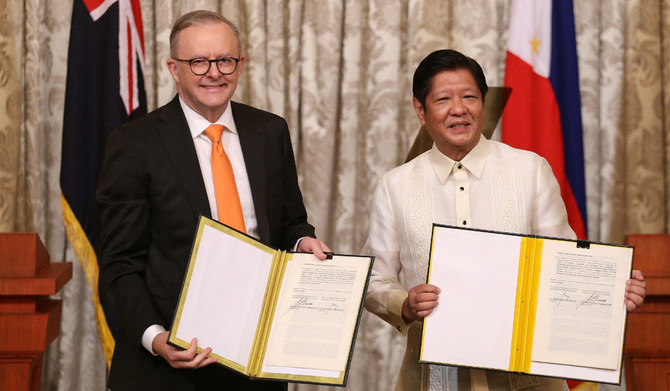MANILA: Australia and the Philippines elevated their seven-decade ties to a strategic level on Friday to broaden an alliance underpinned by their rejection of China’s increasingly provocative actions in the disputed South China Sea.
Australian Prime Minister Anthony Albanese and Philippine President Marcos Jr. signed the pact upgrading their ties in Manila.
They also agreed to hold an annual meeting of their defense chiefs.
Aside from an aim to further boost trade and economic engagement, Albanese said their countries “have common views about the need to uphold international law, and Australia’s position on that will continue to be consistent, as we have always been, including recently over issues relating to the South China Sea.”
SPEEDREAD
Australian Prime Minister Anthony Albanese described the two countries as ‘great friends’ and expressed hope that his visit would help take the relationship ‘to an even higher level.’
China and the Philippines, along with Vietnam, Malaysia, Taiwan and Brunei, have been locked in a decadeslong territorial standoff in the disputed waterway.
It’s a key passageway for global trade and is regarded as an Asian flashpoint.
It’s also where China has repeatedly had tense face-offs with Philippine vessels.
Marcos said he and Albanese “acknowledge that our shared values, the democratic principles and mutual respect for international law, have been instrumental in fostering a strong partnership.”
Marcos said: “Our commitment to these ideals has guided our path forward as we address the complex challenges facing our region and the world at large.”
Albanese described the two countries as “great friends” and expressed hope that his visit would help take the relationship “to an even higher level.”
In just-concluded summit talks attended by Albanese, Marcos, and several other Western and Asian leaders on Thursday in the Indonesian capital of Jakarta, the Australian premier underscored Canberra’s recognition of — and the need to uphold — a 2016 arbitration ruling by a tribunal set up under the UN Convention of the Law of the Sea that invalidated China’s expansive territorial claims in the South China Sea on historical grounds.
The Philippines sought the arbitration after China forcibly took control of a disputed shoal after a tense 2012 sea standoff.
China did not participate in the arbitration, rejected its outcome as a sham, and continues to violate it.
Marcos thanked Albanese for renewing Australia’s position during the Jakarta summit talks, where Chinese Premier Li Qiang was also in attendance.
“You have made very clear that the claims that are being made upon our Philippine maritime territory are not valid and have not been recognized, and not in conjunction or consistent with international law,” Marcos said. “To have friends like you and partners like you, especially on that subject, is very gratifying and encourages us to continue down that path.”
Australia, along with the US and Japan, immediately condemned an Aug. 5 action by a Chinese coast guard ship that used a water cannon to block a Philippine boat delivering food and other supplies to Filipino forces stationed at the Second Thomas Shoal.
China also claims the atoll and has surrounded it with Chinese coast guard ships and militia vessels in a yearslong standoff.
While Albanese and Marcos were meeting Friday in Manila, two Philippine supply boats en route to the Second Thomas Shoal were blocked by a Chinese coast guard ship and other Chinese vessels, but managed to breach the blockade and reached the Filipino sailors stationed in a long-marooned and rusting navy ship, Philippine security officials said.
The Philippine government condemned the Chinese coast guard’s actions and vowed it would not be deterred by the aggression and continue the supply missions.
An inter-agency government body dealing with the territorial disputes said it “strongly deplores and condemns the continued illegal, aggressive, and destabilizing conduct of the Chinese coast guard and Chinese maritime militias within our nation’s Exclusive Economic Zone.”















